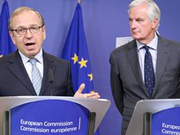Making EU Banks safer by ringfencing speculative trading

On 2 October the Liikanen report, on reforming the structure of the EU banking sector, was presented to key decision-makers. The review, chaired by Erkki Liikanen, governor of Finland’s central bank, provides the first pan-EU proposal for restructuring big banks, with a novel twist on the trading restrictions of the US Volcker rule and the UK Vickers reforms.
More than a dozen of Europe’s biggest banks face the upheaval of building a ring-fence around their trading activities if the findings of the EU-appointed Liikanen review are implemented. The likes of Deutsche Bank, Barclays and BNP Paribas are likely to be hit the hardest.
UNI Europa Finance has been supporting ring-fencing speculative investment banking for several years and now welcomes the Liikanen report’s conclusion. We believe that liabilities caused by speculative investment should not undermine the well-functioning of real banking activities and that the systemically relevant role of banks as financial intermediaries needs to be ring-fenced and safeguarded.
The Liikanen report recommends a set of five measures that complement the regulatory reforms already enacted in the EU. Alongside the trading firewall are other proposals to make banks safer and protect taxpayers, including measures to rein in bonuses and take a tougher approach to the risks of property lending conducted by retail banks.
The main recommendation is to require a legal and economic separation of the risky financial activities from deposit banking within the same banking group. The activities to be separated would include proprietary trading of securities and derivatives if these amount to a significant share of a bank's business or if the volume of these activities can be considered significant from the viewpoint of financial stability. As a consequence, deposits would no longer directly support risky trading activities and both parts of the new, restructured banking group would have to maintain separate ring-fenced capital and have separate funding.
The Liikanen report is echoing the British Vickers report from last year, however the latter includes even stronger measures of ring-fencing as it recommends ring-fencing all investment banking activities from retail banking.
UNI Europa Finance’s believes that commercial and retail operations need to be fully insulated from high-risk speculative activities and investment banking, in particular in terms of covering the liabilities arising from these. A measure in line with the Vickers recommendation would be more costly and harder to implement for the banks in the short-term, but it would mean lower social costs for the whole society in the long-term, making the EU banks much safer.
UNI Europa now urges the European Commission to take the report’s findings on board in order to make banking groups safer and less connected to trading activities, which will reduce the systemic risk of further financial crises. As the separation would make the structure of banking groups simpler and more transparent, it would also facilitate market discipline and supervision and, ultimately, recovery and resolution.
All eyes are now on Michel Barnier, the EU commissioner responsible for financial services, who will have the final say on whether to push forward a Liikanen-inspired legislative proposal.

